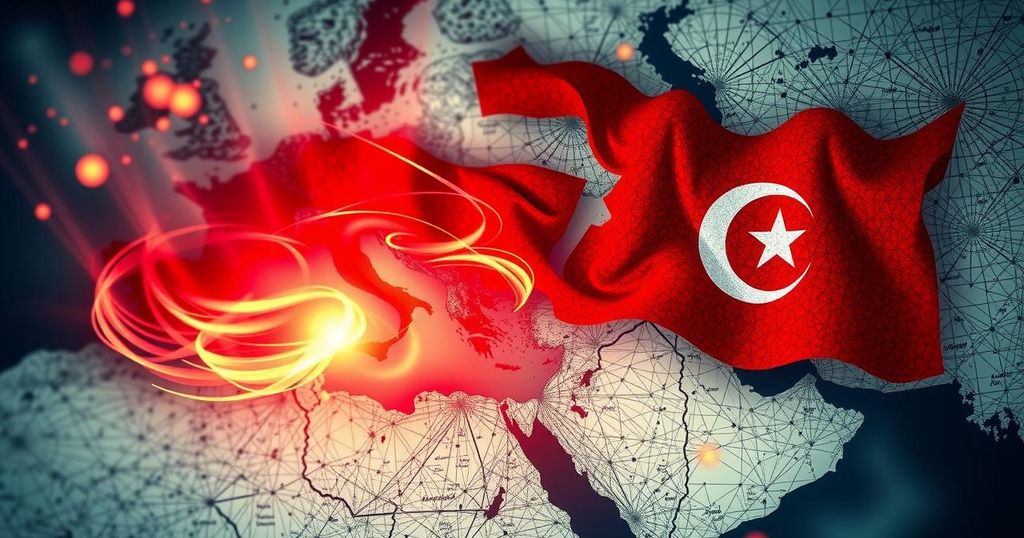Russia’s Strategic Shift: The Fragile Transition from Syria to Libya
Russia’s strategic transition from Syria to Libya reflects its efforts to consolidate power in the Mediterranean amid the fragility of alliances. The reliance of leaders like Assad and Haftar on Russian support underscores vulnerabilities that can lead to instability. The West faces challenges in effectively countering Russia’s influence due to misconceptions about local dynamics and the need for structural reforms in Libya.
Russia is undergoing a significant strategic shift as it transitions its focus from Syria to Libya. The recent developments in Syria, culminating in the fall of Damascus, have exposed the vulnerabilities inherent in alliances forged through coercion and mutual convenience, especially following the decline of Bashar al-Assad’s regime. To respond to this setback, Moscow is repositioning its military assets towards Libya, where General Khalifa Haftar and the Libyan National Army (LNA) await support.
This move is not merely a replacement of one proxy with another but reflects a consistent approach in Russian foreign policy aimed at countering Western influence while extending its power projection in the Mediterranean—a goal rooted in historical aspirations dating back to the Russian Empire. The parallels between the leadership styles of Assad and Haftar indicate that both depend heavily on Russian backing to sustain their regimes and disrupt Western interests, raising concerns about their inherent fragility and reliance on foreign support.
The West’s previous disengagement from Libya has inadvertently allowed Russia and other external players to expand their influence. As Washington attempts to reevaluate its stance on Haftar, it underestimates his entrenchment with Moscow, characterized by a reliance on Russian military assets and logistical support. International players must recognize that Haftar’s instability reflects a broader pattern where external backing serves as the foundation for his power, rather than loyalty or autonomous strength.
Haftar’s recent actions have further solidified his ties with Russia, even as he manipulates international relations to navigate sanctions and garner support. This development underscores the paradox of his situation: the more he consolidates his authority, the more reliant he becomes on Russian aid. The experience of past regimes, including that of Gaddafi, serves as a cautionary tale of how perceptions of invulnerability can give way to political and social collapse.
For the West to effectively counter Russia’s influence in Libya, it is critical to recognize the limitations of its approach and prioritize structural reforms in Libya. The focus should shift from ephemeral alliances with figures like Haftar to nurturing robust governance and economic resilience, thus mitigating potential exploitation by foreign powers. Moreover, fostering accountability and reducing opportunities for foreign manipulation remain paramount to stabilizing the region.
In conclusion, the strategic recalibrations in Libya signal a continued commitment by Russia to expand its footprint in the Mediterranean. The critical lesson for Western stakeholders is to proactively engage with Libya’s realities rather than react to them, thereby ensuring that their policy responses are informed and effective in countering Russian maneuvers.
The article examines the evolving dynamics of Russian foreign policy in the Mediterranean, particularly its recent pivot from Syria to Libya. The analysis highlights the implications of this shift, focusing on the fragile nature of alliances built on coercion, exemplified by the fates of Bashar al-Assad and Khalifa Haftar. It underscores the importance of recognizing the vulnerabilities of authoritarian figures backed by foreign powers and the necessity for the West to reassess its strategies in a region dominated by external influence.
The West must learn from past errors in Syria and Libya by acknowledging the necessity for proactive engagement rather than reactive positioning. Enhancing governance, fostering economic resilience, and supporting cohesive political frameworks will enable Libya to resist external exploitation. Russia’s increasing involvement with figures like Haftar highlights the need for comprehensive strategies that prioritize stability over opportunistic alliances, thereby redefining the global balance of power.
Original Source: www.atlanticcouncil.org




Post Comment